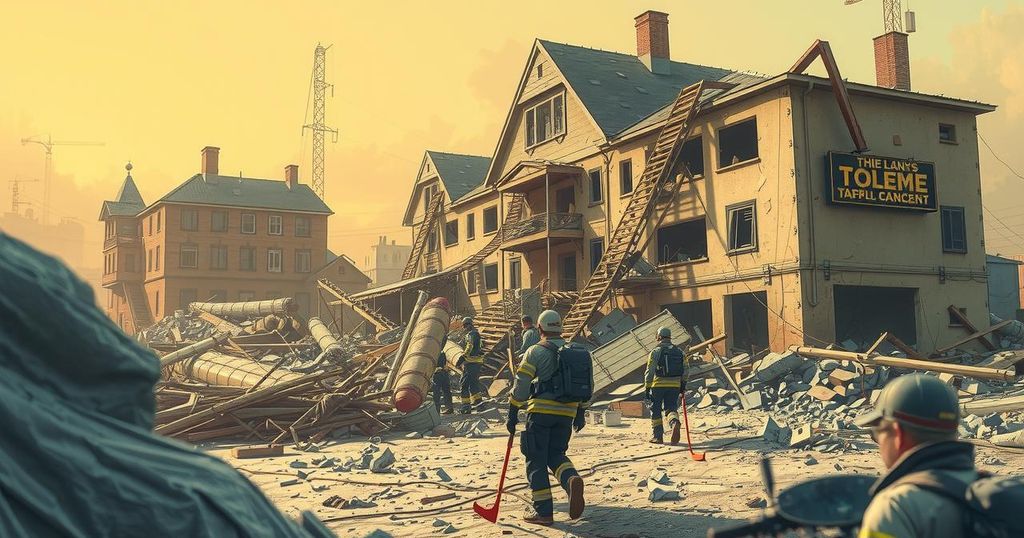Weather
ASIA, BANGKOK, DISASTER MANAGEMENT, EUROPE, FLOODING, FLOODS, GENEVA, JULIA REES, MARCO, MARCOLUIGI CORSI, MIN AUNG HLAING, MONSOON, MYANMAR, NAYPYITAW, OCHA, OFFICE FOR THE COORDINATION OF HUMANITARIAN AFFAIRS, RESCUE OPERATIONS, REUTERS, S OFFICE FOR THE COORDINATION OF HUMANITARIAN AFFAIRS, SWITZERLAND, THAILAND, U. N, UNICEF, WORLD HEALTH ORGANIZATION
Michael Grant
0 Comments
Myanmar Earthquake: Rising Death Toll and Hope Amidst Despair
The humanitarian crisis in Myanmar worsens following a 7.7 magnitude earthquake, with expected death tolls surpassing 3,000. Rescue efforts continue, but chances of finding survivors dwindle as essential supplies run low. The situation compounds existing challenges due to ongoing civil war and military control. International aid is crucial to address urgent needs, including shelter and clean water.
On Tuesday, rescue efforts in Myanmar’s capital led to the survival of a 63-year-old woman, but hopes of finding additional survivors from the devastating earthquake are diminishing. The leader of Myanmar’s military junta reported an anticipated death toll exceeding 3,000, with over 441 individuals still unaccounted for following the 7.7 magnitude quake. The United Nations Office for the Coordination of Humanitarian Affairs underscored the urgency, stating that critical search and rescue operations face narrowing timeframes.
Julia Rees, UNICEF’s Deputy Representative for Myanmar, highlighted the escalating humanitarian crisis, stating that essential supplies like shelter, clean water, and medicine are severely lacking in the affected regions. The World Health Organization has reported substantial damage, with more than 10,000 buildings across central and northwest Myanmar either collapsed or severely affected. The quake has also left a trail of destruction in Thailand, adding to the overall death toll.
Remarkable rescues continue despite the grim situation. In Mandalay, 403 people have been rescued, although many victims remain trapped, including 150 individuals beneath a collapsed monastery. Concurrently, international aid is arriving slowly, and while some teams, including one from China, have successfully rescued individuals from wreckage, operations are hindered by insufficient heavy machinery and resources.
The aftermath of the earthquake exacerbates an already dire humanitarian crisis, with millions displaced by Myanmar’s ongoing civil war. Following a coup in 2021, the military regime struggled for control, complicating access for aid organizations. Despite continuous military attacks, the National Unity Government, a faction of ousted lawmakers, has declared a ceasefire to facilitate humanitarian efforts.
Amidst rising tensions, it remains uncertain how the military government will handle foreign aid delivery. Senior Gen. Min Aung Hlaing confirmed on the day of the quake that Myanmar would accept international assistance. The focus of observers now remains on immediate life-saving efforts to mitigate the compounded effects of the earthquake and ongoing conflict.
In summary, the aftermath of the recent earthquake in Myanmar has intensified an already critical humanitarian crisis, with the death toll expected to exceed 3,000 and thousands more unaccounted for. While some miraculous rescues inspire hope, the situation remains precarious due to the ongoing civil war and challenges in providing timely aid. The need for clean water, shelter, and other supplies is urgent, prompting calls for international assistance to ensure that aid reaches the victims rather than being obstructed by the military authorities.
Original Source: www.cbsnews.com




Post Comment